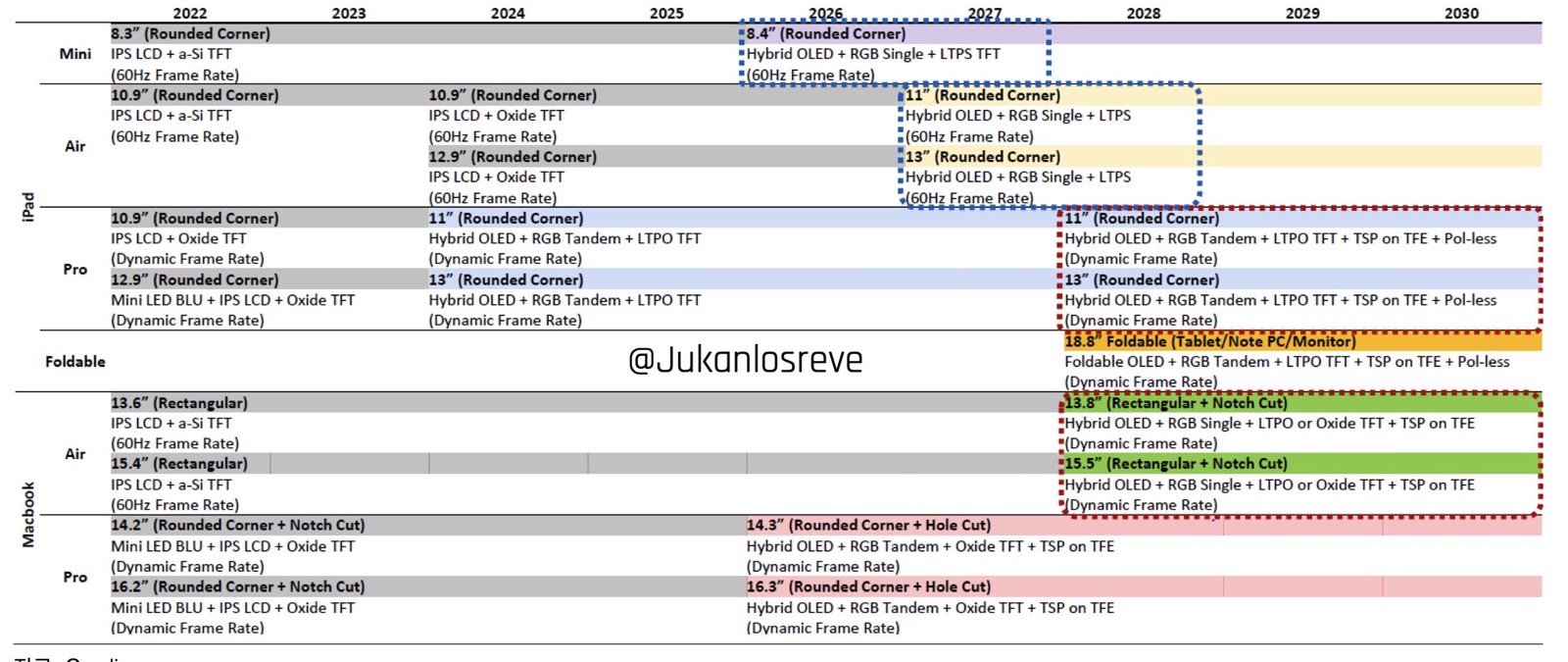Apple’s plans to manufacture foldable devices keep leaking with some regularity. These leaks suggest that Apple is actively researching technologies related to foldable iPhone and MacBook/iPad devices and that such devices might hit stores in the coming years.
Some past rumors claimed that Apple might launch a foldable MacBook before it makes a foldable iPhone, but more recent leaks suggest the reverse might happen. A few days ago, display experts familiar with the various innovations in the field said that a foldable iPhone might be due as soon as 2026. When it drops, that foldable iPhone should reignite sales in the foldable smartphone niche.
Back in August, Ming-Chi Kuo said that the foldable MacBook won’t launch sooner than 2028, citing technical challenges that prevent Apple from starting manufacturing in the first half of 2026. Kuo said at the time that Apple has pushed back its schedule to the end of 2027 or 2028.
A few months later, we have a purported roadmap that shows Apple’s display needs for the various iPads and MacBooks it plans to launch in the coming years. The documentation reportedly comes from research firm Omdia. One obvious thing from the leaked slide is the transition to OLED panels for many Apple iPads and MacBooks in the next few years.
The foldable MacBook project also stands out immediately. If the information is accurate, then we’re looking at a 2028 release for the foldable MacBook, and that’s assuming things go as planned.
According to leaker Jukanlosreve, the iPad mini will get an OLED panel in mid-2025, followed by the iPad Air a year later. Also, in mid-2025, the MacBook Pro will get its OLED panels.
Then, in mid-2027, the iPad Pro, foldable MacBook, and the MacBook Air will move to OLED panels.

I’ll point out these aren’t release windows for the unreleased iPad and MacBook generations I’ve mentioned. Instead, we’re probably looking at development/manufacturing periods for the OLED screens.
How do I know? The big tandem OLED display upgrade that the M4 iPad Pro introduced earlier this year has a mid-2023 window on the roadmap.
If accurate, the document suggests that Apple might have finalized development plans for the M4 iPad Pro panels in the second half of 2023. Its supply chain partners, including Samsung and LG, started manufacturing in the months preceding the M4 iPad Pro launch.
I’ll also remind you of the various display reports that preceded the M4 iPad Pro launch that detailed the manufacturing issues Apple and its suppliers might have experienced. Even older reports claimed that Samsung at one point refused to manufacture Apple’s tandem panels for the OLED iPad Pro before agreeing to build them.
What I’m getting at is that roadmaps from research firms are one thing, while real-life development plans are another.
With that in mind, the mid-2027 window the analysts set for the 18.8-inch foldable OLED panel Apple will need for a foldable MacBook indicates the actual product might ship about a year later or mid-2028.
The analysts refer to the 18.8-inch foldable device as a “Tablet/NotePC/Monitor” product without using identifiers.
What’s interesting to me is that the foldable MacBook will feature the same technology as the 2028 iPad Pro models. We’re looking at “RGB Tandem + LTPO TFT + TSP on TFE + Pol-less” display tech, which will make a dynamic frame rate possible. That’s another synonym for dynamic 120Hz refresh rate, which Apple calls ProMotion on the iPhone and iPad.
Interestingly, the same, or almost the same, display tech will be used on the first-gen OLED MacBook Air models. According to the leaked presentation, these will also probably launch in mid-2028. And yes, the same OLED display tech would also apply to the first OLED MacBook Pro models, which could launch at some point next year or in 2026.
Even if the information in the table is accurate, don’t expect any confirmations anytime soon. We’ll have to wait and see what Apple does next in terms of display innovations. The iPad mini 7 and M4 MacBook Pro models were just released, so we’ll have to wait a while to see upgrades. According to the table, these are the first Apple products to get OLED panels after this year’s M4 iPad Pro.








